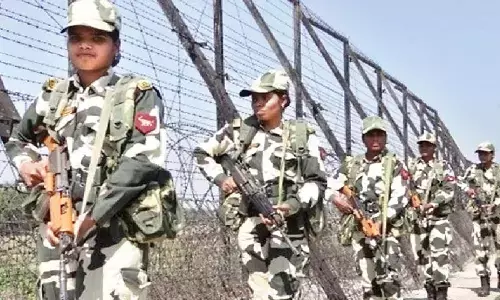BNS Bill 2023 redefines terrorism, enhances security landscape in India
Share :

The proposed Bharatiya Nyaya Sanhita (BNS) Bill 2023 has formally defined terrorism as a distinct offense, marking a significant stride in India's fight against threats to its unity, integrity, and security.
New Delhi: The proposed Bharatiya Nyaya Sanhita (BNS) Bill 2023 has formally defined terrorism as a distinct offense, marking a significant stride in India's fight against threats to its unity, integrity, and security.
Bill's new section 111, which encompasses the "offense of a terrorist act," outlines a comprehensive range of actions that constitute terrorism within the nation's legal framework.
As per the drafted legislation, the core focus of section 111 is to safeguard the nation from acts that endanger the public's safety, create fear, and disrupt public order. The bill explicitly includes a broad spectrum of actions, from wielding lethal weapons to deploying life-threatening substances, in its definition of terrorism. It also extends its purview to acts of hijacking and abduction, especially when carried out to coerce government bodies.
Notably, the bill recognises any act listed in the second schedule of the Unlawful Activities (Prevention) Act as a terrorist act. This inclusion emphasises the intention to curtail all activities with potential ties to terrorism, irrespective of the specific label they might bear.
The BNS Bill establishes a strict protocol for identifying individuals involved, either directly or indirectly, in terrorist acts. Such individuals will be designated as terrorists under section 111, regardless of the scale of their involvement.
The legislation further extends this classification to encompass entities owned or managed by individuals or groups linked to terrorism, effectively branding them as terrorist organisations.
“A person is said to have committed a terrorist act if he commits any act in India or in any foreign country with the intention to threaten the unity, integrity and security of India, to intimidate the general public or a segment thereof, or to disturb public order by doing an act, (i) using bombs, dynamite or any other explosive substance or inflammable material or firearms or other lethal weapons or poison or noxious gases or other chemicals or any other substance (whether biological or otherwise) hazardous in nature in such a manner so as to create an atmosphere or spread a message of fear, to cause death or serious bodily harm to any person, or endangers a person’s life,” the bill reads.
The clause II of the section 111 stated that to cause damage or loss due to damage or destruction of property or disruption of any supplies or services essential to the life of the community, destruction of a Government or public facility, public place or private property will also be considered as a terrorist act.
The act further read that extensive interference with, damage or destruction to critical infrastructure and to provoke or influence by intimidation the government or its organisation, in such a manner so as to cause or likely to cause death or injury to any public functionary or any person or an act of detaining any person and threatening to kill or injure such person in order to compel the government to do or abstain from doing any act, or destabilise or destroy the political, economic, or social structures of the country, or create a public emergency or undermine public safety will also be terrorist act.
To ensure deterrence, the bill introduces severe penalties for those found guilty of terrorism-related offenses. The most severe penalty -- death or life imprisonment -- applies to cases where a terrorist act leads to loss of life. Additionally, a minimum fine of Rs 10 lakh rupees is mandated in such instances. In cases without loss of life, a minimum sentence of five years (extendable to life imprisonment) is stipulated.
Section 111 also addresses acts committed in preparation for terrorist acts, imposing a minimum punishment of five years (extendable to life imprisonment) on those involved.
"Previously, the Indian Penal Code (IPC) did not have dedicated sections for organised crime and terrorist acts. The issue arose when syndicate crimes were committed, and such definitions used to get derived from special enactment acts. This posed challenges for prosecution due to the absence of corresponding sections in the IPC,” said Siddharth Malkania, a Criminal Lawyer based in Delhi.
“Now, In BNS 2023, provisions with detailed explanations have been proposed for Organised Crime Syndicate involving gang/mafia, Continuing Unlawful Activities in which more than one charge-sheets have been filed, Economic Offenses including hawala transactions, and Terrorist Acts including preparation, participation and promotion of terrorism. This change is expected to increase the likelihood of convictions to prove its case by the prosecution," explained Malkania.
It is essential to highlight that while the BNS Bill defines terrorism for the first time, it does not nullify the application of the Unlawful Activities Prevention Act (UAPA), which specialises in dealing with terrorist activities.
The significance of this legislative stride is underlined by the BNS Bill's intention to replace the Indian Penal Code, 1860, with a more comprehensive framework that aligns with contemporary challenges. It is important to note, however, that this transition will not impact other special enactment acts such as the Maharashtra Control of Organised Crime Act (MCOCA), 1999.








